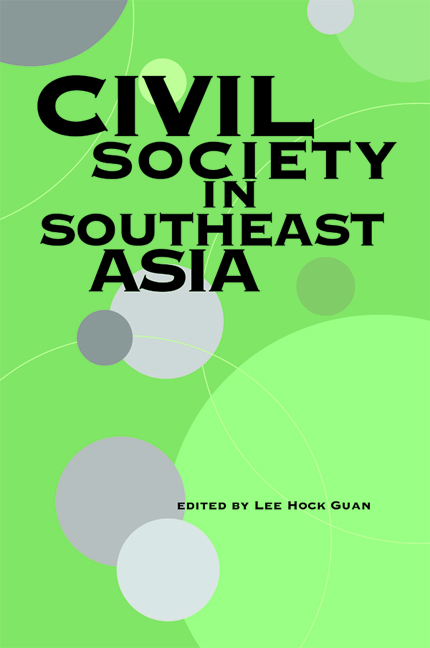Book contents
- Frontmatter
- Contents
- Preface
- About the Contributors
- 1 Introduction: Civil Society in Southeast Asia
- 2 Islam, Constitutional Democracy, and the Islamic State in Malaysia
- 3 Cracks in the Wall of Separation?: The Church, Civil Society, and the State in the Philippines
- 4 New Buddhism, Urban Space, and Virtual Civil Society
- 5 Women's Movement in the Philippines and the Politics of Critical Collaboration with the State
- 6 Participation of the Women's Movement in Malaysia: The 1999 General Election
- 7 Civil Society Effectiveness and the Vietnamese State — Despite or Because of the Lack of Autonomy
- 8 Relationship between State and Civil Society in Singapore: Clarifying the Concepts, Assessing the Ground
- 9 Civil Society in Malaysia: An Arena of Contestations?
- 10 Ethnicity and the Civil Rights Movement in Indonesia
- 11 Civil Society Discourse and the Future of Radical Environmental Movements in Thailand
- Index
8 - Relationship between State and Civil Society in Singapore: Clarifying the Concepts, Assessing the Ground
Published online by Cambridge University Press: 03 November 2017
- Frontmatter
- Contents
- Preface
- About the Contributors
- 1 Introduction: Civil Society in Southeast Asia
- 2 Islam, Constitutional Democracy, and the Islamic State in Malaysia
- 3 Cracks in the Wall of Separation?: The Church, Civil Society, and the State in the Philippines
- 4 New Buddhism, Urban Space, and Virtual Civil Society
- 5 Women's Movement in the Philippines and the Politics of Critical Collaboration with the State
- 6 Participation of the Women's Movement in Malaysia: The 1999 General Election
- 7 Civil Society Effectiveness and the Vietnamese State — Despite or Because of the Lack of Autonomy
- 8 Relationship between State and Civil Society in Singapore: Clarifying the Concepts, Assessing the Ground
- 9 Civil Society in Malaysia: An Arena of Contestations?
- 10 Ethnicity and the Civil Rights Movement in Indonesia
- 11 Civil Society Discourse and the Future of Radical Environmental Movements in Thailand
- Index
Summary
INTRODUCTION
There are sections of civil society in Singapore that live a troubled and tenuous existence. Actors in these constituencies see the state as wanting to co-opt or weaken them through a protracted war of attrition. There are other sections of civil society that work quietly and effectively with different levels of encouragement from and co-operation with the state. Even the concept of civil society in Singapore is an intensely contested one as it encapsulates this larger process of contestation and negotiation between the government and civil society actors.
This chapter will provide a brief review of the evolution of state–civil society relations since Singapore's independence in 1965 to the present moment. It will draw on a survey of civil society organizations and examples of interaction between the two sectors for a better understanding of the present relationship and its implications for the nature of governance and political development in the future.
HISTORICAL CONDITIONS: EVOLVING ROLE OF CIVIL SOCIETY IN GOVERNANCE
PAP's Ideology of Statism
Singapore has been widely recognized as a successful developmental state where the state has actively planned and directed the country's transformation into one of the most competitive economies in the world. Gross domestic product (GDP) grew at an annual average rate of 8.7 per cent per annum (1990 market prices) and per capita GDP increased from $1,567 to $36,963 from 1965 to 2000, reaching a high of $39,585 in 1994 (current market prices). The average household earned $4,166 a month and the median household $3,040 a month in 2000 (1990 market prices). The average household income grew at an average of 3.1 per cent from 1990 to 2000, and median income at 2.8 per cent for the same decade. More recently, however, the income of the higher-income households has been growing faster than the lower-income ones such that the income disparity has widened. The Gini coefficient moved up from 0.436 in 1990 to 0.481 in 2000.
Singapore is a one-party dominant system, where the People's Action Party (PAP) has formed the government at every general election from 1965 to 2001. Chalmers (1992) has organized the political economy of the PAP's development and governance strategy in its first two and a half decades in power — we shall call it the PAP Ideology of Statism — into three main tenets.
- Type
- Chapter
- Information
- Civil Society in Southeast Asia , pp. 167 - 197Publisher: ISEAS–Yusof Ishak InstitutePrint publication year: 2004



